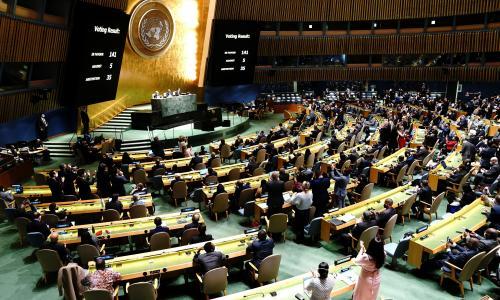
The United Nations has voted overwhelmingly for a resolution deploring Russia’s invasion of Ukraine and called for the immediate withdrawal of its forces, in a global expression of outrage that highlighted Russia’s increasing isolation.
In an emergency session of the UN’s general assembly, 141 of the 193 member states voted for the resolution, 35 abstained, and five voted against. The only countries to vote no in support of Moscow were Belarus, North Korea, Eritrea and Syria. Longstanding allies Cuba and Venezuela joined China in abstaining.
Related: Russia-Ukraine war latest: UN general assembly votes overwhelmingly to deplore invasion – live
The resolution, said the UN “deplores in the strongest terms the aggression by the Russian Federation against Ukraine”. It demanded that “the Russian Federation immediately cease its use of force against Ukraine” and “immediately, completely and unconditionally withdraw all of its military forces”.
The resolution is not legally binding, but is an expression of the views of the UN membership, aimed at increasing pressure on Moscow and its ally, Belarus.
“It isn’t going to stop Russian forces in their stride, but it’s a pretty enormous diplomatic win for the Ukrainians and the US, and everyone who has got behind them,” Richard Gowan, UN director at the International Crisis Group, said.
Speaking before the vote, the US ambassador to the UN, Linda Thomas-Greenfield, compared the Russian invasion to the Nazi conquest of Europe.
“A few of the eldest Ukrainians and Russians might recall a moment like this, a moment when one aggressive European nation invaded another without provocation to claim the territory of its neighbour, a moment when a European dictator declared he would return his empire to its former glory and invasion that caused a war so horrific, that it spurred this organization into existence,” Thomas-Greenfield said.
The Ukrainian permanent representative, Sergiy Kyslytsya, appealed to countries considering an abstention on the grounds that “it is not my war”.
“It is a mistake. The evil will never stop. It requires more and more space to conquer. If tolerated it advances further and further,” Kyslytsya said. “The draft resolution is one of the building blocks to build a wall to stop it to stop in Ukraine and not to let it go further.”
The Russian permanent representative, Vasily Nebenzya, repeated Moscow claims that its forces were not targeting civilian areas. He attributed the lopsided nature of the vote to behind-the-scenes coercion on member states from Ukraine’s allies.
“We know about the unprecedented pressure that our western partners are exerting on a large number of countries urging them to vote as they [the west] see fit,” Nebenzya said. “This is not something even we can call pressure. It was open and cynical threats.”
On Friday, Russia was the sole vote against a similar resolution in the security council, but because Russia is one of the five powers with a veto, the resolution was not upheld. So Ukraine’s allies referred the matter to the general assembly.
It is the first time in 40 years the security council has referred a crisis to the assembly and only the 11th time an emergency session of the UN general assembly has been called since 1950.
It was summoned under a “uniting for peace” resolution, in which global threats are referred to the body “if the security council, because of lack of unanimity of the permanent members, fails to exercise its primary responsibility to act as required to maintain international peace and security”.
In a reflection of the worldwide outrage at the Russian attack on Ukraine, six of Moscow’s allies who stuck by Russia in 2014, in a similar vote after the annexation of Crimea, abstained on this occasion: Armenia, Bolivia, Cuba, Nicaragua, Sudan and Zimbabwe. Another supporter from 2014, Venezuela, did not vote on Wednesday.
Hungary and Serbia, European countries with the closest ties to Moscow, voted for the resolution condemning the Russian invasion.
“The Republic of Serbia is committed to observing principles of territorial integrity and political independence of states as one of the basic principles of international law,” the country’s permanent representative, Nemanja Stevanović, told the assembly.
Nebenzya shrugged off the significance of the vote, making clear that Russia would press on with its offensive.
“This document will not allow us to end military activities,” Nebenzya said, blaming the fighting on “radicals and nationalists” in the Kyiv government.




